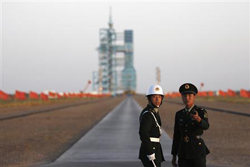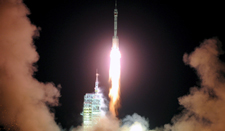print Print...
NOTE: Anti-satellite weapons (ASAT) are designed to incapacitate or destroy satellites for strategic military purposes. Currently, only the United States, the former Soviet Union, and the People’s Republic of China are known to have developed these weapons.
 (by Andrea Shalal-Esa, Reuters) – WASHINGTON – The United States is concerned about China’s expanding ability to disrupt the most sensitive U.S. military and intelligence satellites, as Beijing pursues its expanded ambitions in space, according to multiple sources in the U.S. government and outside space experts.
(by Andrea Shalal-Esa, Reuters) – WASHINGTON – The United States is concerned about China’s expanding ability to disrupt the most sensitive U.S. military and intelligence satellites, as Beijing pursues its expanded ambitions in space, according to multiple sources in the U.S. government and outside space experts.
A classified U.S. intelligence assessment completed [at the end of 2012] analyzed China’s increasing activities in space and mapped out the growing vulnerability of U.S. satellites that provide secure military communications, warn about enemy missile launches and provide precise targeting coordinates, said the sources, who were not authorized to speak publicly.
“It was a very credible and sobering assessment that is now provoking a lot of activities in different quarters,” said one former government official who is familiar with U.S. national security satellite programs.
The intelligence report raised red flags about Beijing’s ability to disrupt satellites in higher orbits, which could put the most sensitive U.S. spacecraft at risk, according to the sources. China has already conducted several anti-satellite tests at lower orbital levels in recent years.
Given the heightened concerns, Washington is keeping a watchful eye on Chinese activities that could be used to disrupt U.S. satellites. It is also urging Beijing to avoid a repeat of its January 2007 test that created an enormous amount of “space junk,” said one senior defense official.
Details of the latest Chinese moves that have raised U.S. concerns remain classified.
U.S. officials charge that China’s anti-satellite activities are part of a major military modernization that has seen Beijing test two new stealth fighters; step up cyber attacks on foreign computer networks; and launch more commercial and military satellites in 2012 than the United States.
China still lags behind the United States in most military fields.
“What we’re seeing is a heightened sense in the United States that China is a potential threat and that it has the technology to be a threat if it wishes to,” said Jonathan McDowell, with the Harvard-Smithsonian Center for Astrophysics. …
Six years ago, on Jan. 11, 2007, China destroyed one of its own defunct weather satellites in low-earth orbit, which created over 10,000 pieces of debris that pose a threat to other spacecraft. A less-destructive test followed on Jan. 11, 2010.
Space experts and U.S. officials say they expect China to continue testing anti-satellite technologies, although they doubt it would repeat the 2007 test, given the massive international outcry it triggered.
Gregory Kulacki, a respected researcher with the Union of Concerned Scientists, reported earlier this month…that there was “a strong possibility” of a new anti-satellite test by China within the next few weeks. He said Chinese sources had told him in November that an announcement about an upcoming anti-satellite test had been circulated within the Chinese government, and a high-ranking U.S. defense official confirmed in December that Washington was “very concerned” about an imminent Chinese anti-satellite test. …
The Pentagon said it was aware of reports predicting another test, but declined comment on what it called “intelligence matters.” …
Sources within the U.S. government and outside experts said there was no immediate evidence pointing to the preparations for the type of satellite or rocket launches used by China for past anti-satellite tests at lower orbits.
But they said Beijing could test its anti-satellite weapons in other ways that would be harder to detect, such as by jamming a satellite’s signals from the ground or issuing a powerful electromagnetic pulse from one satellite to disable another.
China could also maneuver two satellites very close together at higher orbits, replicating actions it has already taken in lower orbits in August 2010 and November 2010. Such activities could be used to perform maintenance or test docking capabilities for human spaceflight, but could clearly be used for more destructive purposes as well, they said.
The United States has continued to test its own anti-satellite capabilities. In February 2008, a missile fired from a U.S. Navy cruiser in the north Pacific destroyed an ailing American satellite in orbit.
The U.S. government said [that the reason they destroyed it in space was because] the satellite’s toxic fuel posed a risk upon re-entry of the earth’s atmosphere. Skeptics said the test was a message to China.
Any further anti-satellite test by China would be troubling, especially if it occurred at higher altitudes, said Bruce MacDonald, a former White House official who is now a senior director at the U.S. Institute of Peace.
The United States operates its fleet of Global Positioning System (GPS) satellites in medium earth orbit about 11,000 miles above the surface of the earth, while U.S. military communications and early missile warning satellites are located in geostationary orbit 22,000 miles above the equator.
Brian Weeden, technical adviser for the nonprofit Secure World Foundation and a former Air Force space and missile expert, said a Chinese anti-satellite test at those higher orbits would put U.S. satellites at risk.
“Some critical U.S. assets in that region have been assumed for the most part to be safe from those kind of attacks,” he said. “Such tests would signal that they’re not.”
Reprinted here for educational purposes only. May not be reproduced on other websites without permission from Thomson Reuters. Visit the website at Reuters.com.
Questions
1. Why did the U.S. initiate an intelligence assessment last year on the threat to U.S. satellites posed by the Chinese?
2. How does the U.S. military use the satellites which are in jeopardy of potential attack from China?
3. How is the U.S. government responding to the report?
4. Why haven’t the details of the threat to U.S. satellites from China been publicized?
5. a) What is an anti-satellite weapon?
b) Instead of destroying a satellite with an anti-satellite weapon as they did in 2007, how might China test its weapons’ capabilities without being detected?
6. What known anti-satellite capability does the U.S. have?
7. At some point, after perfecting this capability, it is probable that the Chinese government would use it on U.S. satellites. What do you think is the best way to prevent this from happening?
- engage in discussions with China
- threaten China with military action
- impose economic sanctions on China
- continue to develop and maintain better anti-satellite weapons so they know we will destroy their satellites if they attempt to destroy ours, etc.
- strike first and destroy all of China’s satellites
Explain your answer.
Resources
Read about anti-satellite weapons at wikipedia.org/wiki/Antisatellite_weapon.
Watch a news report on China’s space activities:
Daily “Answers” emails are provided for Daily News Articles, Tuesday’s World Events and Friday’s News Quiz.




